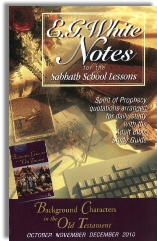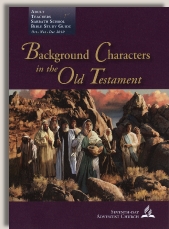|
||||||||||||||
Commentary on "Abiathar: The Priest"
Day 6: Thursday, November 11, 2010 - Abiathar's Fate
Today’s lesson, Abiathar’s Fate, provides a lesson in logic that must not be avoided.
At the bottom of the page (86 in the Teacher’s Quarterly) we find this paragraph:
Free choice is one of the most sacred gifts God has given us. It came with a great cost, too: the death of Jesus on the cross. (Had we not been given free choice, we could not have chosen to sin, and Jesus would not have died for us.) How carefully do you think through and pray through the decisions you make?
1. Is free choice “one of the most sacred gifts God has given us”? The discussion about free choice versus predetermined actions is not a Biblical argument, but a theological argument. We must remember that theology is something Christians (and others) engage in, but it is not the Word of God. Arminianism versus Calvinism is a discussion from the 14th century onwards. The word of God predates these arguments, and stands above all human reasoning. To state that this is “one of the most sacred gifts” is clearly human reasoning that has no basis in Scripture.
2. Did free choice come with a “great cost … the death of Jesus on the cross”? If so, then Adam and Eve did not have free choice as Jesus had not yet died on the cross. If free choice came by the death of Jesus on the cross, and Adam and Eve sinned, then sin was a predetermined act that God had ordained and Adam and Eve could not avoid. Therefore they had no free choice. This logic makes God the author of sin.
3. The next fallacy in this argument is very subtle. The author states, “had we not been given free choice, we could not have chosen to sin.” This statement suggests that free choice is what allows us to choose to sin or not to sin. God could have created Adam and Eve without free choice, while still allowing them to choose between two options: to eat or not to eat of the tree. It is not free choice that allows us to choose, it is God who allows us to choose. The elevation of free choice in this argument comes dangerously close to idolatry.
4. “[W]e could not have chosen to sin, and Jesus would not have died for us.” Again, a subtle problem, but critical to our understanding human nature and the holiness of God. The way this phrase is arranged, the suggestion is made that Jesus’ death for us is so important that, had we not sinned, it would not have happened. Of course this is true. However, to suggest that Jesus’ death is better than having not sinned is a grave problem. (In more ways than one!) This type of argument is eerily close to the Mormon argument that it was good that Adam and Eve sinned so that we could experience the blessings of redemption through Jesus Christ. All of these arguments completely ignore the utter devastation that original sin caused to the human race and the cost to God of his redemption provided on the cross. This thinking leads to the next argument which is implied by the sequencing of statements in this sentence.
5. “Had we not been given free choice … Jesus would not have died for us.” The implication that it would be better to have free choice and have Jesus die on the cross, than be without free choice is ignoring the holiness of God and the absolute filthiness of sinful human nature. Is not the true response of the Christian to glorify God? Although difficult to think through, would not a holy person prefer that Christ never had to come in humiliation to a race destroyed by sin? Christians glory in the cross, but to say that we prefer that Jesus had died for us, providing free choice is tantamount to wanting God to die rather than being locked into some confinement of our behavior.
Given the problems with this paragraph, the final sentence is irrelevant. Rather than pray about the decisions we make, let us make sure that we are not worshipping the creature rather than the Creator. Pray to God for understanding of our complete depravity and his complete holiness. (Note: our complete depravity is an Arminian doctrine, not just Calvinist. See John Miley’s Arminian systematic theology for a treatment of this.)
Summary
- Free choice is not one of the most sacred gifts God has given us.
- Free choice did not come at a great price; the death of Jesus on the cross.
- Free choice versus no free choice ignores other possibilities, such as limited choice. Regardless of whether Adam and Eve’s choice was free, they are completely responsible for the sinfulness into which the human race was plunged.
- Had we not chosen to sin, Jesus would not have needed to die for us. This was a glorious possibility before Adam and Eve sinned. This is not a negative possibility. It would have been better that Jesus had not had to come and die for us, than for Adam and Eve to have sinned.
Copyright 2010 BibleStudiesForAdventists.com. All rights reserved. November October 3, 2010. This website is published by Life Assurance Ministries, Glendale, Arizona, USA, the publisher of Proclamation! Magazine. Contact email: BibleStudiesForAdventists@gmail.com.
The Sabbath School Bible Study Guide and the corresponding E.G. White Notes are published by Pacific Press Publishing Association, which is owned and operated by the Seventh-day Adventist church. The current quarter's editions are pictured above.
Official Adventist Resources
Standard Edition Study Guide Week 7
Teacher's Edition Study Guide Week 7
Easy Reading Edition Study Guide Wk 7
Search the Complete Published Ellen G. White Writings


